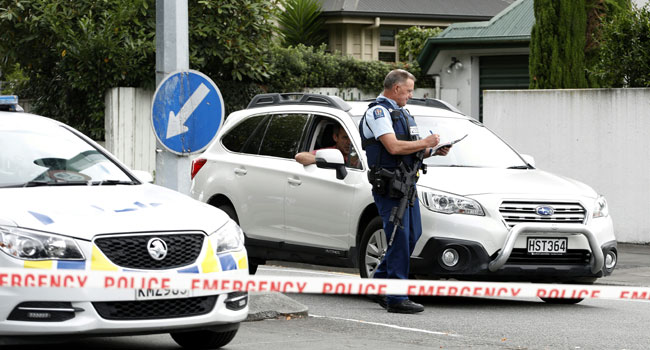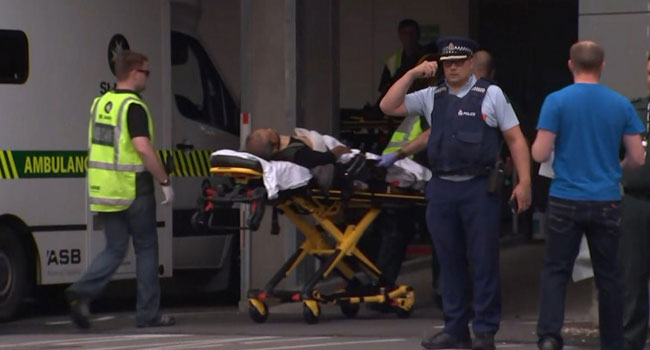
Tessa BURROWS / AFP
A right-wing extremist armed with semi-automatic weapons rampaged through two mosques in the quiet New Zealand city of Christchurch during afternoon prayers Friday, killing 49 worshipers and wounding dozens more.
The attack, thought to be the deadliest against Muslims in the West in modern times, was immediately dubbed terrorism by Prime Minister Jacinda Ardern, as she led a shocked nation on one of its “darkest days.”
The attacker live-streamed footage of himself going room-to-room, victim to victim, shooting the wounded from close range as they struggled to crawl away.
READ ALSO: Man Charged With Murder For New Zealand Attack
A 28-year-old Australian-born man has been arrested and charged with murder.
He will appear at the Christchurch District Court early Saturday. Two other men remain in custody, although their link to the attack is unknown.
Despite his arrest, police warned New Zealanders Saturday to remain vigilant, saying there was “no guarantee the risk is limited” to the Christchurch region.
“Our investigations are in their early stages and we will be looking closely to build a picture of any of the individuals involved and all of their activities prior to this horrific event,” police added in a statement.
The chief suspect allegedly published a racist “manifesto” on social media before the attack, featuring conspiracy theories about Europeans being displaced, and details of two years of preparation and radicalisation leading up to the shootings.
“It is clear that this can now only be described as a terrorist attack,” said Ardern, who is expected to visit Christchurch Saturday. “From what we know, it does appear to have been well planned.”
Two improvised explosive devices (IEDs) were found in a car and neutralised by the military, police said.
Speaking in Sydney, Australian Prime Minister Scott Morrison described the gunman as “an extremist, right-wing, violent terrorist”.
His two targets were the Masjid al Noor mosque, where 41 people were killed, and a second, smaller mosque in the suburb of Linwood, where seven more died. The remaining victim succumbed in hospital.
The dead were said to include women and children.
Around 42 people were treated for gunshot wounds at Christchurch Hospital, with two in critical condition. One of them, a four-year-old, was being transferred to another hospital Saturday.
The survivors included 17 members of Bangladesh’s cricket team, whose game against New Zealand on Saturday has been postponed, and a Palestinian man who fled for his life after seeing someone being shot in the head.
“I heard three quick shots, then after about 10 seconds it started again. It must have been an automatic — no one could pull a trigger that quick,” said the man, who did not wish to be named.
“Then people started running out. Some were covered in blood,” he told AFP.
Mosque warning
New Zealand police described the footage shot by the gunman as “extremely distressing” and warned web users that they could be liable for up to 10 years in jail for sharing such “objectionable content”.
In addition to the footage — which AFP has verified, but is not distributing — a number of pictures were posted to a social media account showing a semi-automatic weapon covered in the names of historical figures, many of whom were involved in the killing of Muslims.
The attack has shocked New Zealanders, who are used to seeing around 50 murders a year in the entire country of 4.8 million and pride themselves on living in a secure and welcoming place.
Police, who initially imposed a city-wide lock down, sent armed officers to several locations.
In Auckland, 1,000 kilometres (600 miles) away, two unattended bags left near a railway station were detonated by military explosives experts.
Police also attended a property in Dunedin which they believe is linked to the attack and evacuated nearby residents.
The southern city was named in the suspect’s manifesto as the original target for his attack.
Police warned Muslims across the country not to visit mosques “anywhere in New Zealand” in the wake of the Christchurch attacks. Friday is Islam’s holy day.
‘Bodies all over’
The attack shocked the local Muslim population, many of whom had come to New Zealand as refugees.
One witness told news website Stuff he was praying when he heard shooting — and then saw his wife lying dead on the footpath outside when he fled.
Another man said he saw children being shot.
“There were bodies all over,” he said.
At least two Jordanians were among the dead, according to that country’s foreign minister, while Pakistan foreign ministry spokesman Mohammed Faisal said four citizens of his country were being treated in hospital for injuries and another five were missing.
The attacks sparked horror and revulsion around the world.
US President Donald Trump condemned the “horrible massacre” in which “innocent people have so senselessly died”.
“I informed the Prime Minister that we stand in solidarity with New Zealand –- and that any assistance the U.S.A. can give, we stand by ready to help,” he tweeted.
Mass shootings are very rare in New Zealand, which tightened its gun laws to restrict access to semi-automatic rifles in 1992, two years after a mentally ill man shot dead 13 people in the South Island town of Aramoana.
However, anyone over 16 can apply for a standard firearms licence after doing a safety course, which allows them to purchase and use a shotgun unsupervised.
Christchurch, a relatively small city on New Zealand’s south island, hit global headlines in 2011 when it was struck by a deadly earthquake, killing more than 180 people.
AFP

